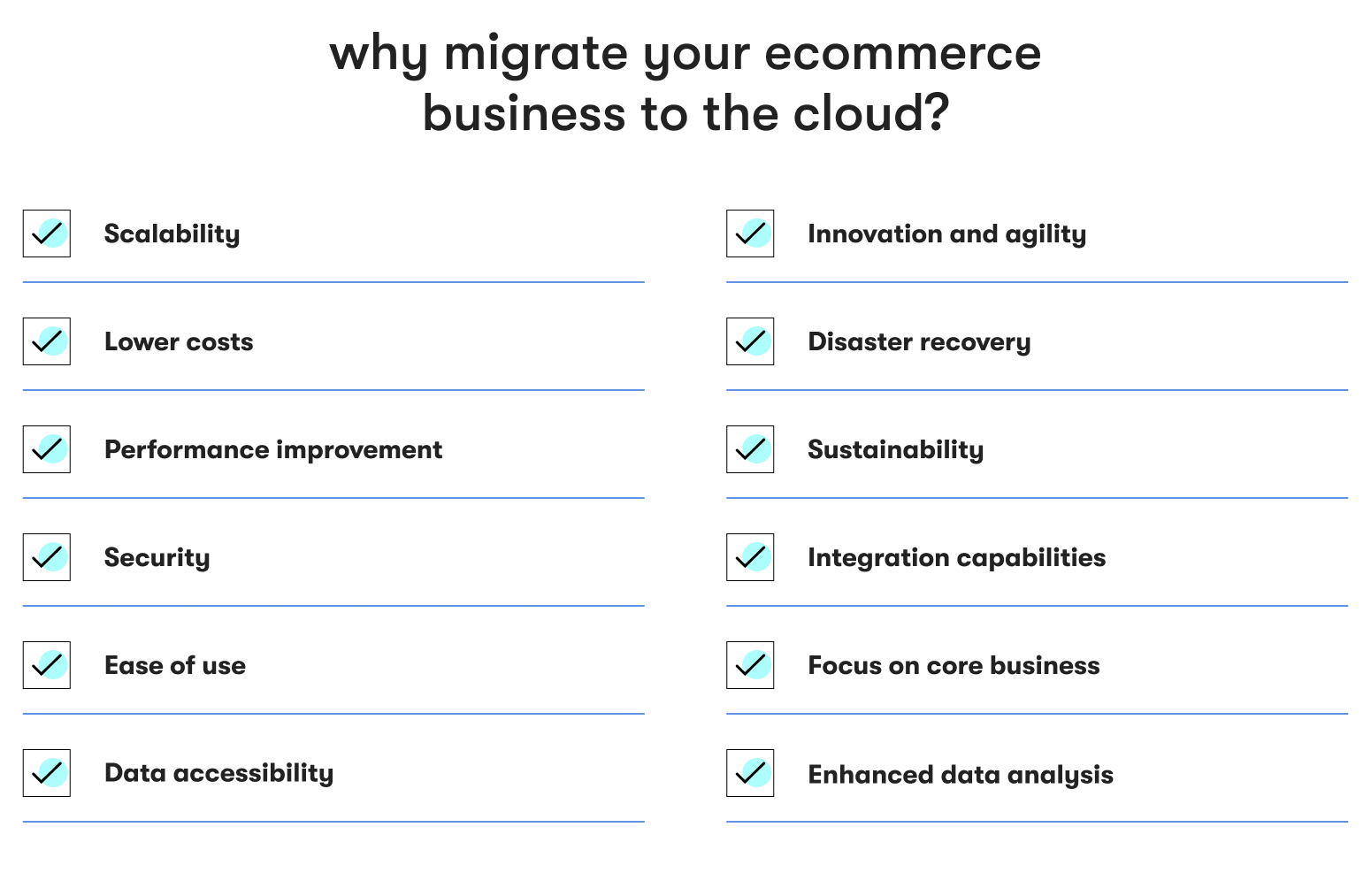The ecommerce industry has grown exponentially over the past few years, with businesses constantly looking for innovative ways to improve their operations. One of the most effective and popular ways to achieve this is by leveraging the power of cloud computing. This article explores the benefits of cloud-based ecommerce, its architecture, top platforms, and cloud migration.
What is cloud ecommerce?
Cloud ecommerce, or ecommerce cloud, refers to using cloud technology in ecommerce businesses. It uses cloud-based platforms to run online stores, manage inventory, process payments, and handle other ecommerce operations. The shift from traditional hosting environments to cloud-based solutions provides businesses with many benefits, such as scalability, flexibility and cost-efficiency.
Cloud-based ecommerce platforms are designed to handle large volumes of data and transactions, making them an ideal solution for businesses of all sizes. They offer advanced features such as machine learning for customer behavior analysis, inventory management tools for efficient operations, and robust security measures to protect sensitive data.
Cloud service models include the following:
- IaaS: Infrastructure as a service provides businesses with fundamental resources like servers, storage, and networking capabilities on a pay-as-you-go basis. This model allows businesses to avoid buying and managing their physical servers.
- PaaS: Platform as a service allows developers to build, test, and deploy applications without managing the underlying infrastructure. This model accelerates app development, testing, and deployment, which benefits businesses looking to develop custom ecommerce solutions.
- SaaS: Software as a service is a software delivery model where a cloud provider hosts applications and makes them available to users online. In the context of ecommerce, SaaS solutions provide businesses with ready-to-use ecommerce tools that can be easily customized to meet specific business needs. This model eliminates the need for businesses to install and run applications on their servers, saving them time and resources.
Architecture of cloud commerce solutions
The architecture of a cloud ecommerce platform is designed to provide a robust, secure and scalable environment for online businesses. It involves several components: data storage, database management, application servers, and user interface.
The data storage component stores sensitive customer information, product details, and transaction history. This data is typically stored in the cloud, providing businesses with unlimited storage capacity and easy access to their data from anywhere.
The database management component handles the organization catalog management and retrieval of this data. It ensures that data is stored in a structured manner and can be easily retrieved when needed. This component is crucial for providing customers with accurate and timely information.
The application servers run the software applications that power the ecommerce store. These applications handle product listing, order processing, and customer service tasks.
The user interface provides a digital commerce store with a platform for customers to interact with. It includes the website or app through which customers browse products, place orders, and communicate with the business.
TRANSFORM YOUR ECOMMERCE BUSINESS WITH THE CLOUD
Leverage our cloud ecommerce solutions for enhanced scalability, security and customer experience.
Expanding the power of ecommerce with top cloud ecommerce platforms
The digital and commerce business landscape has seen a tremendous shift with the advent of cloud ecommerce platforms. These platforms have revolutionized how businesses operate online, offering various features and tools that boost efficiency, enhance customer experience, and drive sales. From inventory management to customer data analysis and personalized shopping experiences, cloud ecommerce platforms offer a comprehensive suite of tools for digital commerce for businesses of all sizes.
BigCommerce: A comprehensive ecommerce solution
BigCommerce stands out among ecommerce platforms for its comprehensive set of ecommerce tools. It provides businesses with robust inventory management capabilities, efficient payment processing systems, and insightful customer data analysis tools. Moreover, BigCommerce offers a flexible platform for building custom apps, allowing businesses to tailor their online stores to their unique needs. This flexibility makes it an ideal choice for businesses looking for a growth-ready platform.
Shopify: User-friendly and feature-rich
Shopify is another popular ecommerce platform known for its user-friendly interface. It offers many features, including catalog management, sales strategies, and third-party integrations. Shopify's ease of use and comprehensive feature set makes it a popular choice for SMBs.
Adobe Commerce Cloud: Advanced features for personalized experiences
Adobe Commerce Cloud, part of the Adobe Experience Cloud, combines the capabilities of Magento Commerce and Adobe Experience Manager to provide a powerful ecommerce solution. It offers advanced features like machine learning and customer behavior analysis, enabling businesses to create personalized shopping experiences. These advanced features make Adobe Commerce Cloud a preferred choice for businesses leveraging data and technology stack to enhance their ecommerce operations.
Magento Commerce: A robust platform for large enterprises
Magento Commerce is designed for large enterprises. It offers advanced features like customer segmentation, targeted promotions, and custom product relationships. Magento Commerce also provides robust inventory management and order processing capabilities. This is a preferred option for businesses with complex operations and high sales volumes.
Salesforce Commerce Cloud: Unified commerce experience
Salesforce Commerce Cloud provides a unified commerce experience across all channels. It offers predictive intelligence, order management, and customer service features. Its comprehensive feature set makes it an ideal solution for businesses of all sizes.
Commercetools: A flexible and scalable headless commerce solution
Commercetools is a headless cloud commerce platform that allows businesses to build unique customer experiences. It offers multi-tenant architecture, microservices, and an API-first approach, making it a flexible and scalable solution for modern businesses. This platform is an excellent choice for businesses looking to future-proof their ecommerce operations.
WooCommerce: An open-source platform for WordPress users
WooCommerce is a popular open-source ecommerce platform built for WordPress. It offers a high level of customization, allowing businesses to design their online store according to their customer preferences. WooCommerce offers various features, including product management, sales strategies, and customer data analysis. Its integration with WordPress makes it a go-to choice for businesses that want to leverage the power of content marketing along with ecommerce.
Volusion: A comprehensive and user-friendly platform
Volusion is a comprehensive and user-friendly ecommerce platform. It offers features like inventory management, payment processing, and customer relationship management. Volusion also provides a robust website builder to create attractive and functional online stores. Its user-friendly interface and feature set make it a popular choice for businesses of all sizes.
Wix ecommerce: A simple and intuitive platform
Wix ecommerce is a simple and intuitive ecommerce platform. It offers a drag-and-drop website builder, making it easy for businesses to create online stores. Wix ecommerce also features product management, order tracking, and customer data analysis. Its simplicity and ease of use make it a popular choice for small businesses and startups.
5 steps to successfully move to ecommerce cloud
Moving to a cloud ecommerce platform can be complex, but it can be done smoothly and effectively with the right approach. Here are the steps to follow:
Step 1: Choose a cloud platform
The first step to moving your ecommerce business to the cloud is to choose a suitable cloud ecommerce platform. This decision should be based on several factors, including your budget, technical capabilities, and the specific features you need for your online store. Popular ecommerce platforms such as Adobe Commerce or Salesforce Commerce Cloud offer unique features and benefits. The best ecommerce platform for you depends on your business structure, size, and goals. It's important to consider the platform's reputation, read customer reviews, and evaluate its support level. Some platforms provide superior customer service, extensive resources, and a community of users for support, which can benefit businesses that are new to cloud ecommerce.
Step 2: Create a migration plan
After choosing a cloud platform, the next step is to create a cloud migration plan. This involves mapping out the entire migration process, including data migration, application migration, and testing. Data migration involves transferring your existing customer data, product catalog, and order history to the new platform. Application migration refers to moving your own ecommerce websites and software, digital ecommerce software and applications, and any custom apps to the cloud. Planning this process carefully minimizes downtime and ensures a smooth transition. Your IT team or cloud hosting providers can assist with this process, ensuring your online business continues operating efficiently during the transition.
Step 3: Ensure post-migration support and troubleshooting
After the migration process, supporting users and troubleshooting any issues is crucial. This includes training staff on how to use the new system, addressing any technical issues, and ensuring customer satisfaction. It's also important to monitor your cloud ecommerce solution and store's performance and adjust as needed. Cloud ecommerce stores and solutions often include analytics tools for insights into customer behavior, sales strategies, and overall ecommerce journey, helping you continuously improve your online business.
Step 4: Implement security measures
Protecting sensitive data is a top priority when moving to a cloud ecommerce platform. Cloud platforms often offer advanced features like machine learning for threat detection and automated backups for data storage. Regular audits of your ecommerce websites, commerce software, cloud services, and hosting environment help identify potential vulnerabilities and ensure regulatory compliance.
Step 5: Integrate third-party apps
Finally, integrate third-party apps that can enhance your ecommerce operations. These can include payment gateways for efficient payment processing, CRM systems for managing customer data, marketing tools for attracting new customers, and inventory management systems for easily managing your product catalog. With a flexible platform, you can add different platforms that suit your business needs. Integrating these applications into your ecommerce software can streamline operations, improve customer experience, and contribute to the overall success of your ecommerce business.
UPGRADE YOUR ECOMMERCE STORE WITH CLOUD TECHNOLOGY
Discover how our cloud-based ecommerce solutions can drive your business growth and efficiency.
Reasons to migrate your ecommerce business to cloud

Migrating your ecommerce business to the various cloud commerce systems can offer several benefits. From scalability and cost efficiency to performance improvement and enhanced security, cloud ecommerce platforms provide a robust and flexible platform for running your online business. Moving to the ecommerce cloud services can strategically drive your ecommerce journey forward.
Scalability
Cloud platforms are known for scaling up or down based on demand. This feature is particularly beneficial for ecommerce businesses, which often experience fluctuations in traffic and sales. With a cloud ecommerce platform, businesses can easily manage their resources to match their current needs. This flexibility allows for a more efficient operation, especially during peak seasons when traffic spikes.
Lower costs
One of the main advantages of using cloud platforms is the potential for lower costs. These platforms are available on a pay-as-you-go model, so you can only pay for the resources you use. This makes cloud-based ecommerce solutions a cost-effective choice for businesses of all sizes.
Performance improvement
Cloud platforms are renowned for providing high-performance computing resources. By migrating your ecommerce store to the cloud, you can improve the store performance so customers can enjoy a more seamless online shopping experience. Additionally, a faster and more reliable ecommerce site can increase sales through a smooth and efficient process.
Security
Security is a top priority for any online ecommerce business, particularly when handling sensitive customer data. Cloud providers invest heavily in security measures. This includes physical security measures to protect data centers, network security to prevent unauthorized access, and data encryption to secure sensitive data. Migrating your ecommerce business to the cloud can give you peace of mind knowing that your customer data is protected and boost your customers' trust in your ecommerce site.
Ease of use
Cloud ecommerce platforms are often designed to be user-friendly, making them easy to navigate and manage even for those with limited technical knowledge. These platforms typically feature intuitive interfaces, comprehensive help guides, and responsive customer support. This ease of use extends to all aspects of managing an online store, from updating product listings and processing orders to analyzing sales data and implementing marketing campaigns. This can free up time and resources, allowing businesses to focus on product development, customer service and strategic planning.
Data accessibility
With a cloud ecommerce platform, your data is accessible from anywhere. This allows you to manage your online business from any location. Whether traveling, working from home, or at multiple business locations, you can keep track of your sales, inventory, customer data, and more. This level of accessibility is great for online businesses with remote teams or multiple locations, enabling seamless coordination and communication.
Innovation and agility
Cloud platforms often have advanced features and technologies like machine learning and artificial intelligence. These can be leveraged to gain insights into customer behavior, personalize customer experiences, and innovate faster. For instance, machine learning algorithms can analyze shopping patterns and preferences to deliver personalized product recommendations, while AI-powered chatbots can provide instant customer service.
Disaster recovery
Cloud platforms provide robust disaster recovery solutions, ensuring business continuity during a system failure or data loss. These platforms typically feature automatic backups and data replication across multiple servers, so you can easily restore your data from the cloud in case of disruptions. This minimizes downtime and potential loss of sales, providing businesses with the peace of mind that their data is safe and recoverable.
Sustainability
Cloud computing is more energy-efficient than traditional web hosting solutions, making it a more environmentally friendly choice. By moving to cloud web hosting now, you contribute to reducing your carbon footprint. Cloud servers are typically housed in data centers designed to optimize energy use, reducing the amount of electricity needed for cooling and power.
Integration capabilities
Cloud platforms offer seamless integration with a variety of third-party software and applications. From accounting software and CRM systems to payment gateways and shipping services, businesses can create a comprehensive ecommerce solution that fits their needs. This seamless integration can help streamline business processes, improve data accuracy, and enhance customer experience.
Focus on core business
By moving to a cloud ecommerce platform, businesses can delegate IT infrastructure management and cloud development services to the cloud provider. This includes server maintenance, software updates, security monitoring, and data backup. As a result, businesses can focus more on their core activities, such as product development, sales strategies, customer service, and business growth.
Enhanced data analysis
Cloud platforms provide powerful data analysis tools with insights into customer behavior, sales trends, and business performance. These tools can analyze large volumes of data in real-time, providing businesses with accurate and up-to-date insights. As a result, businesses can better understand their customers, seize sales opportunities, and make data-driven decisions to grow their online business.
TAKE YOUR ONLINE STORE TO THE NEXT LEVEL WITH CLOUD ECOMMERCE
Harness the power of our cloud ecommerce services to deliver exceptional shopping experiences.
How can EPAM Startups & SMBs help you?
At EPAM, we are experts in digital ecommerce software applications and cloud technology, specializing in ecommerce cloud migration and development. Our team is equipped with the technology stack, knowledge, and skills to assist you in transitioning your ecommerce business to a cloud platform, ensuring a seamless process with minimal downtime.
We start by understanding your business needs. This includes analyzing your current ecommerce software, inventory management, customer data, and overall ecommerce business strategy. Our team is experienced in a range of ecommerce platforms, including Salesforce Commerce Cloud, Adobe Commerce (Magento) and Shopify. Our IT team can recommend the best ecommerce platform that aligns with your business objectives.
Our comprehensive cloud migration strategy involves data storage transfer, database management, website hosting, integration of third-party software, and final testing on the cloud hosting environment. We utilize advanced features of cloud computing, ensuring your sensitive data is securely transferred, and your ecommerce store operates smoothly on the new platform.
We offer extensive support and troubleshooting post-migration, helping your team adapt to the new operating system. We provide training on the new cloud ecommerce software, assist in resolving technical issues, and guide you on effectively leveraging the features of your new cloud ecommerce solution.
We also help with the integration of third-party apps and custom apps that can enhance your ecommerce operations. Whether it's payment processing systems, digital commerce applications, CRM systems, or marketing tools, we ensure your new ecommerce cloud platform works seamlessly with the tools your business relies on.
At EPAM, we understand that every online ecommerce business is unique, as are its cloud migration needs. Whether you're a large enterprise looking for a robust cloud ecommerce solution or a growing online store exploring cost-efficient cloud-based solutions to sell online only, we are here to assist. Our goal is to help you harness the power of cloud technology to improve your customer experience, streamline your operations, and drive your ecommerce business forward.
With our expertise in cloud ecommerce solutions and commitment to your success, we are more than just software as a service provider — we are your trusted partner in your ecommerce journey. Contact us today to learn more about how we can help you realize the full potential of cloud ecommerce.
Conclusion
Transitioning to a cloud-based ecommerce platform offers many advantages that can significantly transform your business operations. Cloud services' scalability ensures that your ecommerce store can adapt and grow with your business. Cost efficiency is another major benefit, with the pay-as-you-go model eliminating the need for hefty upfront investments in IT infrastructure.
Additionally, cloud platforms are renowned for their performance enhancements. From faster load times to seamless browsing experiences, these improvements can significantly boost customer satisfaction and, in turn, your bottom line. Moreover, your sensitive business and customer data are well-protected with robust security measures, including data encryption and advanced threat detection.
However, migrating to a cloud-based ecommerce platform requires meticulous planning, careful execution, and technical expertise. It involves data migration, third-party integrations, potential downtime management, and employee training. A misstep in these areas can lead to data loss, extended downtime, or operational inefficiencies.
Partnering with an experienced provider like EPAM can make all the difference. Our team of experts can guide you through each step of the migration process. We understand the intricacies of cloud migration and can tailor a strategy that aligns with your business needs and goals.
FAQ

Anush has a history of planning and executing digital communications strategies with a focus on technology partnerships, tech buying advice for small companies, and remote team collaboration insights. At EPAM Startups & SMBs, Anush works closely with subject matter experts to share first-hand expertise on making software engineering collaboration a success for all parties involved.
Anush has a history of planning and executing digital communications strategies with a focus on technology partnerships, tech buying advice for small companies, and remote team collaboration insights. At EPAM Startups & SMBs, Anush works closely with subject matter experts to share first-hand expertise on making software engineering collaboration a success for all parties involved.
Explore our Editorial Policy to learn more about our standards for content creation.
read more


















